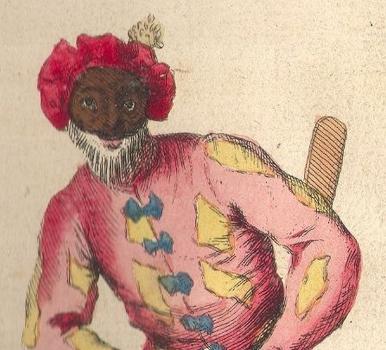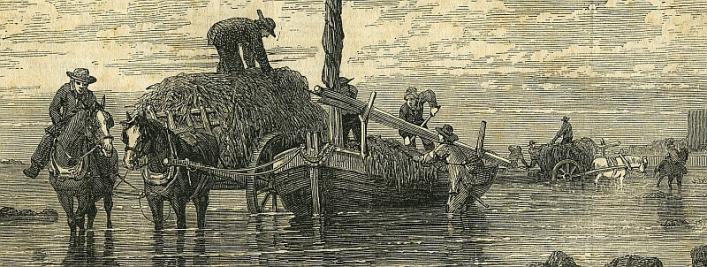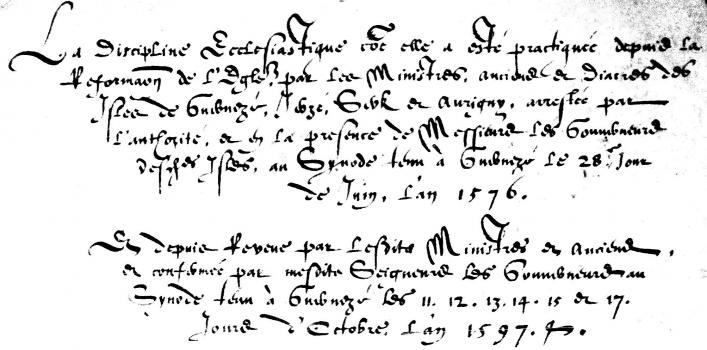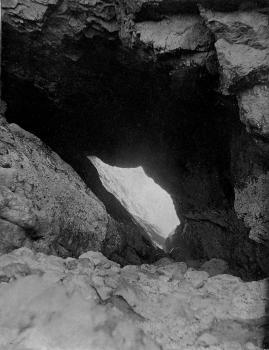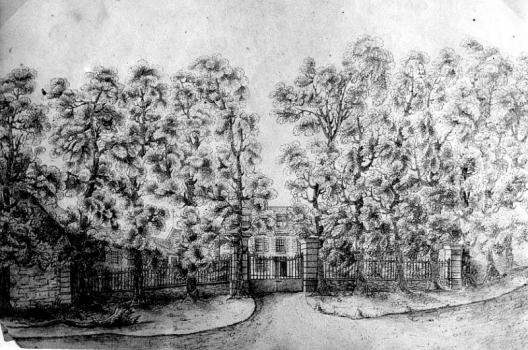The Priaulx Library holds a small suite of rare books on the subject of Italian Comedy, the most desirable of which is probably Luigi Riccoboni's Histoire du theatre Italien, depuis la decadence de la Comedie Latine; avec un catalogue des tragedies et comedies Italiennes imprimees depuis l'an 1500, jusqu'a l'an 1660, et une dissertation sur la tragedie moderne Paris : Imprimerie de Pierre Delormel, Rue du Foin, Sainte Genevieve, 1728. 60p., [18] leaves of hand coloured plates, one folding. (8vo). Bound with Dell'Arte rappresentativa; Capitoli sei, London, 1728.
Almanac Journalier: Guernsey, Chevalier & Mauger, 1820
In the mid-19th century Frederick Clarke produced in his establishment in the States Arcade this little booklet, attempting to distil in four pages the labyrinthine system of weights and measures at that time employed in the island. Its difficulty was compounded by the sheer number of currencies that island merchants and traders had to deal with. The information is taken literally from schoolmaster Thomas du Frocq's Nouveau Precepteur of 1818, which is a (mainly) applied mathematics primer of tortuous complexity and much greater length.
We asked the question—who or what were they?
How to get the best from Guernsey's unique church registers. Now available on FindMyPast (free access in the Priaulx Library).
From Redstone's Royal Guide to Guernsey, written by Louisa Lane Clarke, who produced a new edition in 1856 following Queen Victoria's visit to Guernsey. A rather rosy description of vraicing—the gathering of wrack seaweed—which was in fact a highly competitive scramble for a valuable and free commodity, much prized by the islanders.
An excerpt from the Magasin Pittoresque, 17, of 1849: 'Les Iles Anglaises de la Manche.'
In 1885 was published the original French text of the Ecclesiastical Discipline for Guernsey, edited by the Reverend G.-E. Lee of the Town Church and published by Thomas Bichard of the Bordage. The Police et discipline ecclesiastique was a set of regulations for the management of the Church and its congregation in the island, established by consensus in 1576 and which, despite the severity of its rules, remained in force until the Restoration in 1660, when Charles II imposed a form of Anglicanism on the island.
An extract from the Reverend James Cachemaille's fascinating guide to his adopted home, translated from the French by Louisa Harvey. How his friend the Seigneur discovered the Gouliot Caves, once a famous tourist destination, and a description of their 'Chimney' souffleur in a gale. The photograph of the caves is part of the Priaulx Library Collection and dates from 1900.
The generosity of the Seigneur of Sark, Peter Le Pelley, from one of the two books about the island written by his great friend, the Reverend J L V Cachemaille, for many years the vicar of Sark. In 1860, the diary of the former 17th-century Sark minister, Elie Brėvint, was found in a loft in Sark. Cachemaille was inspired by this to investigate the archives of the Seigneurie and to write a series of articles based upon what he found, which were translated by Louisa Harvey and published in the Guernsey Magazine. From this was published the Descriptive Sketch, published by Frederick Clarke, and then republished in 1928. See Ewen & De Carteret, The Fief of Sark, The Guernsey Press, 1969. The illustrations are from the Library Collection, the drawing showing the Seigneurie in Sark in Le Pelley's time.
Extracted from a review of Guernsey by the then Governor, Lord Hatton, known under the pseudonym of 'Warburton.'
The History Section of the Societe Guernesiaise has produced a set of pedigrees of houses taken from Guernsey's Livres de Perchage, which list the owners of a particular house from the earliest times at which it was rated, together with a glossary of French terms found in these documents. These will prove very useful for genealogists and can be consulted at the Library, as can our collection of original Livres de Perchage.

